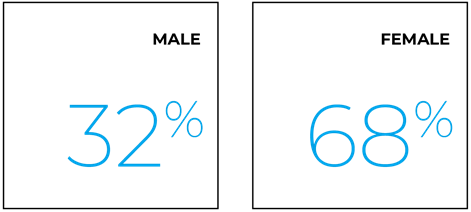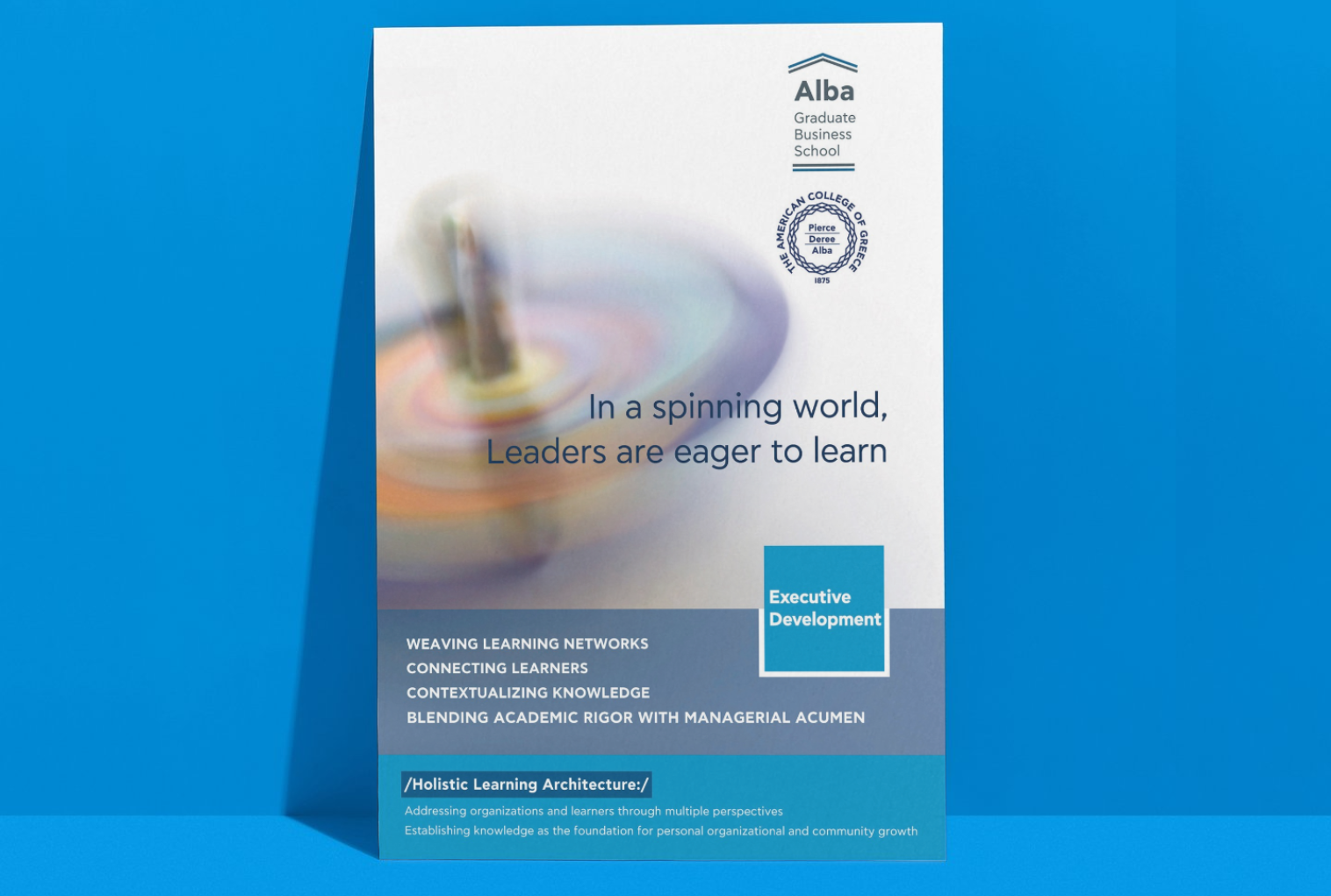MSc in Marketing
BRAND YOURSELFOVERVIEW
Marketing is a key aspect of every business and a fascinating work context. Choosing marketing for your graduate studies will equip you with a strong understanding of the modern business environment and will place you at the core of a company’s decision making. The Alba MSc. in Marketing can prepare you for these challenges. It is a rigorous program aiming to provide current and prospective marketers with a blend of strategic thinking, analytical skills and contemporary marketing tools. The program provides students with an extensive coverage of digital marketing strategies and applications along with marketing metrics and marketing analytics tools to help them foster marketing accountability across their organizations.
Key features of the program
- Weekday classes between 18:00 – 22:00, up to three times per week for the part-time mode;
- A 12-month program (24-month part-time);
- 15 core modules and 3 workshops;
- Assessment: group reports/presentations, case study analysis, mid-term tests, final exams;
- Marketing Consultancy Project or Internship or Dissertation.
The MSc in Marketing Is Designed for:
- Recent university graduates who want to launch a career in marketing and deepen their knowledge of the field;
- Working professionals with an interest in and commitment to marketing, aiming to advance their careers in this field;
- Individuals seeking to (a) enhance their knowledge in digital marketing tools (b) employ marketing analytics to develop marketing consulting skills and (c) advance their critical thinking around marketing to foster marketing accountability in their organizations.
You may find here more information about the Program's Intended Learning Outcomes.
Current Student Profile


HIGHLIGHTS
International Recognition: Accredited by The New England Commission of Higher Education (NECHE).
A focus on applied learning: the program is designed to provide students with opportunities to test the practical relevance of the marketing topics taught through project work, case study analysis, and software applications.
The internship opportunities, for eligible students, it offers internship positions relative to the Marketing field.
Innovative curriculum: the program offers a number of unique courses and workshops:
- Digital Marketing presents with the latest tools of digital marketing communications;
- Marketing Metrics demonstrates key marketing performance indicators;
- Marketing Engineering involves computer-assisted marketing analysis and planning;
- Marketing Consultancy Project relates to a project for a real company;
- Nielsen Retail Measurement presents the Nielsen Methodology on retail data analytics;
- SAS Viya® delivers AI-driven data analytics for marketing decision-making;
FULL TIME
MSc in Marketing Total Year Schedule 2025-2026
The School reserves the right to reexamine the structure of all academic programs and proceed to any necessary changes in the total year schedule.
3rd Period: One from the following three options: Marketing Consultancy Project OR Internship*, OR Dissertation.
* (Internship) This is an option provided only to Greek and EU students. According to Greek labor and immigration law, international VISA holder students are not permitted to do an apprenticeship in Greece. Alternatively, they can access global internship opportunities through the international job portals provided by Alba’s Career Office.
You may find the Graduate Academic Calendar 2025–26 here.
1st Period | Fall 2025
Consumer Behavior
2
This course aims to provide an understanding of the consumer decision-making process by integrating key theoretical perspectives embedded in psychological, sociological and economic principles. Specific goals for this course are to outline the links between consumer behavior research and marketing theory and practice, providing the related academic background, acquaint students with the factors which influence consumer behavior at different stages of the consumption process, and create awareness of the processes that organizations develop to understand consumer and buyer behavior.
Business Statistics
1
Today's business environment is characterised by abundance of information and increasing uncertainty and complexity. Against this background, analysing probabilistic/statistical information, understanding the relationship between business factors, evaluating risks and turning data into actionable knowledge are essential skills for competent management. The main objective of the course is to help participants assimilate statistical concepts as well as acquire skills in applying these concepts using modern software. Topics covered include descriptive statistics, probability distributions, sampling, hypothesis testing and regression analysis.
Financial Fundamentals
1
This short course introduces the basic concepts and tools of Accounting and Finance to non-finance specialists enabling them to communicate effectively with departments of accounting and finance and also understand the financial implications of their decisions and actions. After the completion of this course participants should be able to understand what the objectives of the firm are, read and comprehend the basic financial statements produced by the firm, understand the difference between an expense and an investment, realize the importance of cash flows, access the financial health of the company, understand how the financial markets operate and how the value of a company is calculated, learn about the basic sources of finance, the cost of capital, the working capital, and the economic value added of the firm.
Marketing Research
2
This course is designed to provide students with a fundamental understanding of the field of marketing research. Marketing research concerns the use of scientific methods to identify and define marketing opportunities and problems; generate, refine, and evaluate marketing actions; monitor marketing performance; and improve our understanding of marketing as a process. It concerns the collection and analysis of information in order to reduce uncertainty and provide insights into buying behavior, customer satisfaction, customer preferences, market segmentation, advertising evaluation, product testing, new product development etc. Students will study the central concepts of marketing research, as well as the tools and techniques used in this field to support good marketing decisions.
Brand Management
1
Brand management concerns the process of planning and controlling the firm’s brands and their meaning so that they are aligned with consumer needs and meet corporate goals. This course examines both paradigms in brand management: the classical marketing paradigm that emphasizes the importance of developing strategies that enhance brand equity and endure through time as well as the hit marketing paradigm that emphasizes a short-term perspective in managing brands.The goals are to provide students with an understanding of the role of brands, how they are formed and acquire meanings, how they are managed and how they add value to consumers and the firm.
Business Writing
0.5
The purpose of the workshop is to address the question ‘what is the skill of writing?’. According to the American writer Edwin Schlossberg, “the skill of writing is to create a context in which other people can think”. The workshop explores this statement. This exploration and subsequent understanding is of paramount importance for any business activity, since much of the communication in the business world takes place in writing, usually within tight deadlines, ranging from short, simple e-mails to long, rich documents. The salient gain of the participants from the workshop is the understanding of different modes and purposes of writing, as well as of different types and purposes of documents. The main topics covered during the workshop include: the requirements of different types of documents, such as reports, case studies, research papers and proposals, proper referencing, and the research process.
2nd Period | Winter 2026
Advertising Management
2
The course provides with both advertising theories and a hands on understanding of the complete advertising process, from strategy development, identification of the “big idea,” to execution, and evaluation. Such an approach will allow students to develop a critical understanding of advertising tactics that work, and those which are not effective, along with the reasons of failure.
The learning objectives of this course are:
- To generate an understanding of the nature and scope of advertising
- To familiarize with the advertising tools and practices;
- To raise awareness of the factors contributing to the success of advertising campaigns;
- To provide working knowledge of the steps employed in the advertising process;
- To allow for a hands on experience of the advertising process.
Marketing Strategy
3
Marketing Strategy concerns the development and application of value-enhancing marketing strategies, utilized and executed in dynamic competitive environments. The focal point of this course is strategic marketing analysis and marketing planning. Students will gain considerable experience in the analysis of complex marketing decisions and learn the components and construction of a strategic marketing plan. In addition, students will be exposed to discussions on specific marketing problems, in a variety of situations. Finally, students will compete in a computer-based marketing strategy simulation and submit a business-level marketing plan.
Digital Marketing Strategies
1
Digital marketing is the use of digital technologies to create an integrated, targeted and measurable communication which helps to acquire and retain customers while building deeper relationships with them. Simply put digital marketing is where traditional marketing meets access platforms and communication tools (e.g., organizational websites, portals, search engines, blogs, email, instant messaging, cell phones, video games etc.). The objective of this course is to educate students on the digital marketing strategies that guide digital marketing efforts at a tactical level. The course will cover topics such as information economics and the networked economy, online consumer behavior, trends in media consumption, the digital media landscape, online reputation, performance-based online advertising, social network marketing, and legal issues in online advertising.
Digital Marketing Applications
2
Digital marketing has revolutionized the marketing function and has brought about dramatic changes in the day to day activities performed by marketing managers. To better comprehend the profound implications of digital marketing revolution, modern marketing managers need to develop a good understanding of the actual workings of all applications used in digital marketing.
This course provides an understanding of the most widely used digital marketing applications. Specific goals for this course are to:
• Become familiar with the complete spectrum of digital marketing applications;
• Gain an appreciation of the role of digital marketing applications in the broader array of marketing activities;
• Understand how each digital marketing application can leverage the accomplishment of specific marketing goals;
• Develop an adequate level of skills in handling all digital marketing applications.
International Marketing
1
Developing and selling products in other countries is a very way for sustaining business growth. However, marketing products and services across different countries requires a solid understanding of the local markets and an ability to adjust the marketing mix across such countries. International Marketing aims at providing managers with the tools necessary to analyze the international marketing environment considering the factors crucial for the successful development and sale of products and services abroad.
3rd Period | Spring 2026
Marketing Metrics
1.5
This course demonstrates a number of important marketing-related performance metrics that are critical ingredients of sound decision making across the spectrum of marketing function. Four major categories of metrics are covered including non-financial (i.e., brand awareness, customer satisfaction), financial (i.e., net present value, internal rate of return), customer (i.e., customer lifetime value), and digital (i.e., transaction conversion rate, word of mouth) metrics. The course aims to equip students with the necessary critical and analytical skill for understanding and using these marketing performance metrics. Specific goals for this course are to, introduce students to the importance of marketing accountability, describe in detail the meaning and analytical workings of key marketing performance metrics, and present students with a road-map for selecting the appropriate marketing metrics given specific marketing-related decisions.
Nielsen Retail Measurement
0.5
Nielsen is a leader in collecting, analyzing and creating practical knowledge across all retail sectors in more than 100 countries. Based on this extensive know-how, Nielsen has developed its own methodology for digesting and making sense of the vast retail data available today. This course aims at providing students with the Nielsen methodology; more specifically, to help them familiarize with different retail market facts and terminology, follow standard procedures so as to analyze retail data and solve specific quantitative business issues, and learn how to further dig into data and use alternative information sources simultaneously in order to resolve qualitative business issues.
Personal Selling
1
This course is an applied introduction to professional selling. The course is designed to provide students with functional skills and tools (i.e., resourses, technology and systems, informational and interpersonal skills) allowing them to manage the selling process successfully. Indicative course content includes the following: fundamentals of the professional selling process, dealing with buying objections, closing the selling process, adaptive selling, consultative selling, service and sales relationships, sales force automation tools and ethics in the selling process.
AI for Marketing Decision Making
1.5
Everybody’s talking about the use of Artificial Intelligence Techniques in Marketing and how they can help companies become more effective and efficient in their decision making processes. But for many marketing professionals today, there’s a gap between theory and execution – and it’s getting wider every day. This course is designed to provide an introduction to applying AI techniques to marketing so you can significantly improve outcomes, understand and better serve your customers, create new business models and innovate. It explains not only why you need to make this shift to analytically driven marketing strategies and plans, but most importantly it gives you the opportunity to have hands on experience in applying AI techniques using a state of the art software tool, i.e. SAS Viya (SAS Visual Analytics, Visual Data Mining and Machine Learning and Visual Forecasting). The course will focus on the following techniques: Data Visualization and Reporting, RFM Customer Segmentation. Market Basket Analysis, Demand Forecasting, Customer Response / Campaign Management Models, Churn Prediction and Text Analytics (Sentiment Analysis and Topic Extraction). By the end of the course students will learn about building an analytical framework for marketing that will help them: Increase response rates, customer loyalty, and ultimately ROI, by contacting the right customers with highly relevant offers and messages | Reduce campaign costs by targeting customers most likely to respond. | Deliver the right message by segmenting customers more effectively and better understanding target populations. | Make informed “next best offer” related decisions. | Forecast demand and perform the so-called demand shaping by using techniques such as promotional modelling and price elasticity – optimization. | Understand that there is no art in demand forecasting rather the art lies in analytics and domain knowledge. | Visualize data to aid the decision-making process by finding useful patterns, trends and associations. | Learn how to gain insights from unstructured (text) data with the aid of text analytics. | Appreciate the use of state art business analytics software solutions by SAS i.e. SAS Viya.
Sustainability Business Ethics & CSR
1
Understanding the ethical basis of human behaviour is of fundamental importance for building commitment to organizational goals and for imparting integrity and a sense of the common good in organizational members. The course examines a broad array of matters relating to ethics, including: individual and organizational obstacles to ethics; ethics information processing methods and judging theories; an action-learning framework for ethics leadership; adversarial win-lose ethics methods; integrative win-win ethics methods; dialogic transcendent ethics method; reflection and developing personal and contingency ethics leadership approaches; developing on ethics leadership action-learning plan. The course focuses also on sustainability, corporate social responsibility and corporate accountability with further emphasis placed on business strategies that aim to create long term value and a positive environmental, social and economic impact. Actionable knowledge is achieved by applying theory in real life situations through critical analysis and debating on prominent cases and in class discussions on current trends and developments on sustainable business activities.
Marketing Engineering
4
Upon completing this course, students will be able to use automated spreadsheet software (Excel), in particular the marketing engineering platform “Enginius,” to craft marketing strategy based on marketing’s first principles and data analytics. Specifically, using several cases studies accompanied by marketing datasets and an integrated marketing strategy project where they will collect fresh, primary data using customer experience software (i.e., Qualtrics) students will learn, a) how to understand what customers value through segmentation analytics, b) how to create value for customers through conjoint analytics and, c) how to communicate value to customers through positioning analytics.
Marketing Consultancy Project (upon availability)
4
This is an applied course that gives students the opportunity to systematically explore marketing topics from the program in a real company setting. The course focuses on the development of practical managerial skills through the implementation of a group-based marketing consultancy project with an organization. Students are expected to work in groups on a consultancy project that will address specific marketing issues and problems that are of practical relevance to an individual company and explicitly elaborate on theoretical topics from the core courses.
Dissertation
4
The Dissertation is an independent research project that allows students to explore a topic of personal interest within a faculty member’s area of expertise. Throughout the process, students will develop essential research skills, including designing a detailed research plan, conducting a comprehensive literature review, identifying key research questions, and transforming them into empirical inquiries. They will learn to justify and apply appropriate research methodologies, analyze financial or social data, and synthesize their findings into a well-structured report. The final dissertation will include a literature review, research questions, methodology justification, data analysis, and a discussion of findings in relation to existing research and methodological considerations.
Internship
4
An Internship brings together the academic with the business world, providing benefits both to students and to companies. It has the status of a course, hence it is an obligatory requirement for the fulfilment of the M.Sc. Degree, it carries credits and it is graded. The expected duration is three (3) months, from beginning March to end May.
The benefits for students include the opportunity for the blending of academic and on-the-job learning; the use of the explicit knowledge gained during the program, the attainment of tacit knowledge, the development and diversification of skills, the acquisition of work experience, the identification and/or refinement of career goals, the creation and/or development of a professional network. The benefits for companies include the opportunity to meet some company needs with highly qualified and motivated students, the identification of talent for potential future employment, the enrichment of current perspectives and practices with the intern’s novel ideas, the enhancement of social responsibility activities.
PART TIME
MSc in Marketing Total Year Schedule 2025-2027
1st Period | Fall 2025
Consumer Behavior
2
Financial Fundamentals
1
Business Writing
0.5
2nd Period | Winter 2026
Marketing Strategy
3
Digital Marketing Strategies
1
3rd Period | Spring 2026
Marketing Metrics
1.5
Nielsen Retail Measurement
0.5
Sustainability Business Ethics & CSR
1
Personal Selling
1
4th Period | Fall 2026
Business Statistics
1
Marketing Research
2
Brand Management
1
5th Period | Winter 2027
Advertising Management
2
Digital Marketing Applications
2
International Marketing
1
6th Period | Spring 2027
AI for Marketing Decision Making
1.5
Marketing Engineering
4
Marketing Consultancy Project (upon availability)
4
Dissertation
4
Internship
4
FACULTY

Dr. Koritos has teaching and research interests in the areas of Consumer Psychology, Marketing of Services, Advertising, Corporate Social Responsibility, and Strategic Management. His research focuses on consumer adoption of innovative distribution channels, consumer perceptions of quality in well known versus private label brands, rhetoric in advertising, and attitude formation.
alba profile linkCAREER
After completing the program participants should be able to:
- Apply relevant marketing knowledge to simple and complex marketing problems;
- Readily transfer practical skills and marketing tools to professional marketing positions;
- Strategically think about markets, product and service offerings;
- Analyze customers, competitors, and the internal company environment in a creative and measured way;
- Design, implement and tangibly evaluate marketing programs.
SCHOLARSHIPS
You can secure pre-approval of your scholarship, before you apply for admission to the MBA or MSc program of your choice.
GMAT Scholarships
Scholarships of 40% for MBAs and MSc programs for GMAT ≥ 645
Theodore Papalexopoulos Scholarship
Partial scholarships, based on a combination of academic/professional excellence, high academic & professional potentials and presence of financial need.
Ulysses Kyriakopoulos Expendable Scholarship
Partial scholarships, based on a combination of academic/professional excellence, high academic & professional potentials and presence of financial need.
The Chris Argyris Scholarships
Two (2) partial scholarships amounting to 50% of total tuition fees for various MSc Programs, based on a combination of academic performance & potential.
Next Generation Family Business Scholarship
One (1) merit-based partial awarded to a member of the next generation of a family business for several MBA & MSc programs
SEV (Hellenic Federation of Enterprises) Scholarships
Partial scholarships of 50% to Enterprises members of SEV, offered as rewarding services to the members of the Federation.
ADMISSION REQUIREMENTS
To be considered for admission, candidates must:
- Hold a bachelor degree;
- Provide evidence of excellent command of the English language;
- Need to be currently employed or self-employed (valid for the part time mode only);
- GMAT (Focus Edition) test is optional, unless the Academic Committee requires the applicant to take it: in any case, a GMAT score of 515 or more (GRE >155) can strengthen your application and help you secure a merit scholarship.
Candidates must submit:
- The completed application form, including one recent photograph in jpeg format;
- Two letters of recommendation in Greek or in English language;
- Official academic transcripts as well as certified copies of degrees from each undergraduate, graduate or professional degree earned;
- Proof of competence in the English language (unless schooled in English): Proficiency (Cambridge Proficiency, Michigan Proficiency, MSU Proficiency), or TOEFL, or IELTS, or Duolingo English Test;
- Three essays, as indicated in the Application form;
- Receipt of the non-refundable application fee's [€60] deposit.
Click here to download the details for admission.
For details on academic policy, course credit policy, fee policy, and rules for student conduct, please refer to the Student Handbook .
Additionally, the School's Students Code of Conduct can be found here.
CONTACT

We urge applicants to request further information or to come for a meeting at our downtown campus, in order to better understand their profile and motivations.
Just fill out and submit the form below and we will respond to you as quickly as possible.
Tel.: +30 210 89.64.531 ext. 2289
e-mail: [email protected]

















